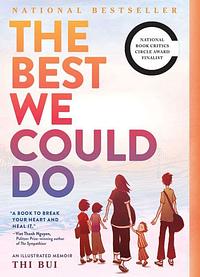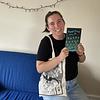You need to sign in or sign up before continuing.
Take a photo of a barcode or cover
challenging
dark
emotional
funny
reflective
sad
tense
fast-paced
emotional
hopeful
inspiring
sad
medium-paced
emotional
reflective
fast-paced
emotional
reflective
slow-paced
The Best We Could Do tells Thi Bui’s family history, from living in Vietnam during the divide to living in the United States as refugees. Bui detailed an insightful history of both Vietnam and her family, rendered in a beautiful and unique art style.
emotional
reflective
sad
fast-paced
I'm pretty sick to death of autobiographical/memoir graphic novels, but this was beautiful and heartbreaking. The adventure and tragedy of being a refugee. Really striking.
challenging
dark
emotional
inspiring
sad
medium-paced
as a child of an immigrant, I connect with so much of the author’s feelings and thoughts when it comes to her parents, to her lineage.
what makes her the person she is? is it her decisions, her parents lives and their experiences? a combination of both or much more?
between the history of Vietnam, the author and her parents, there is so much pain there with pockets of joy. reminders that our parents, as much as we tend to forget, are people, too.
this is an excellent graphic memoir and should be required reading in history classes.
what makes her the person she is? is it her decisions, her parents lives and their experiences? a combination of both or much more?
between the history of Vietnam, the author and her parents, there is so much pain there with pockets of joy. reminders that our parents, as much as we tend to forget, are people, too.
this is an excellent graphic memoir and should be required reading in history classes.
emotional
hopeful
informative
reflective
medium-paced
challenging
dark
informative
reflective
slow-paced
The true strength of this book is Bui's ability to distill history without diluting it. Horrible, pivotal events erupts relentlessly around Bui and the previous generations of her lineage, but she sacrifices complex political explanations to maintain focus on how history consume the lives of regular civilians and how that pain and terror is passed forth to their children.
In the foreward, Bui talks about how the book was thematically centered around the relationships between parents and children, and this really drove my attachment to her story. She explores how crossing the threshold into motherhood allowed her to reexamine her relationship with her own refugee parents, who carried their own demons across the ocean. Even when interacting with my parents as an adult, it is still easy to slip back into my childhood persona. The old anger and resentment at the things they weren't intertwined with an understanding of why they became who they were, even if that person wouldn't make for the best parents in a new country. Perhaps, most succinctly, for them it was "The Best We Could Do."
In the foreward, Bui talks about how the book was thematically centered around the relationships between parents and children, and this really drove my attachment to her story. She explores how crossing the threshold into motherhood allowed her to reexamine her relationship with her own refugee parents, who carried their own demons across the ocean. Even when interacting with my parents as an adult, it is still easy to slip back into my childhood persona. The old anger and resentment at the things they weren't intertwined with an understanding of why they became who they were, even if that person wouldn't make for the best parents in a new country. Perhaps, most succinctly, for them it was "The Best We Could Do."






